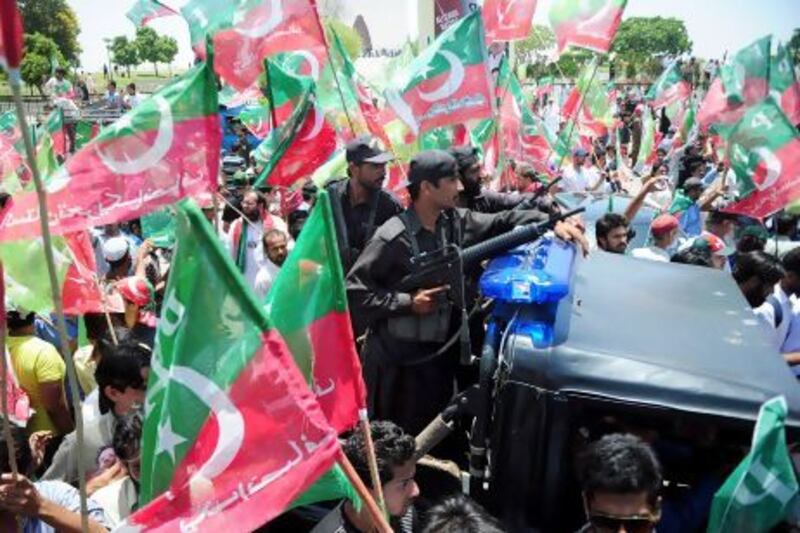KARACHI // During Pakistan's last general election in 2008, Yunus Khan worked long hours canvassing voters and organising rallies across Karachi for the Awami National Party, which galvanised the city's Pashtun communities into a political force for the first time.
But in what normally would be a similarly frenetic week of campaigning before Saturday's balloting for national and regional assemblies, Mr Khan lounged in his living room sipping tea and eating fried chicken, waiting for the sun to set. He is too afraid to campaign during daylight hours.
"I just silently run my campaign," the candidate said as he sat with his two young children. "I go door-to-door in my constituency, no loudspeakers, no car rallies. People are afraid to support us."
Mr Khan has good reason to be fearful. His close friend and party colleague, Sadiq Zaman Khattak, became the first national assembly candidate to die in the pre-election violence after he and his four-year-old son were shot last Friday as they left jumaah prayers.
Pakistani authorities say they plan to deploy more than 600,000 security personnel to guard against attacks during Saturday's voting and ensure a free and fair election. But campaign-related violence in the past month has already cost the lives of Khattak and some 80 other people from mainstream parties that formed the last government in Islamabad.
Most appear to have been targeted by the Pakistani Taliban, which announced a campaign of terror to coincide with the country's historic elections. The polls mark the first time a civilian government completes a full term and hands over power to another through the ballot box, cementing what many consider to be an irreversible transition to full democracy in a country that has been ruled by the military for half its life.
The apparent aim of the Pakistani Taliban's violence is to skew the results of the elections in favour of Pakistan's centre-right and Islamist parties, who have all said they favour negotiations with the militants to end their decade-long war with the Pakistani state.
The outgoing ruling Pakistan Peoples Party (PPP), with its junior partners - the Karachi-based Muttahida Quami Movement (MQM) and the ANP - are all staunchly anti-Taliban and supported the Pakistan military's ongoing fight against the Pakistani Taliban in the Federally-Administered Tribal Areas.
As a result, the ANP has lost dozens of its members in gun, bomb and suicide attacks in north-western Khyber-Pakhtunkhwa province, which they ruled, and in Karachi. The MQM, which is the dominant party in Karachi, has also been targeted on a regular basis, most recently with a double bombing of a party office in the port city that killed two. Yesterday, a roadside bomb at a PPP rally in Khyber-Pakhtunkhwa killed four people.
"This is pre-poll rigging," said Mr Khan. "The right-wing parties have a free hand and we can barely leave our homes."
Indeed, the two front-running parties, the Pakistan Muslim League-Nawaz (PML-N) and the Pakistan Tehrik-e-Insaf (PTI) of former cricketer Imran Khan, as well as the mainstream Islamist parties, have all failed to condemn the violence against their rivals.
The PPP and ANP in particular were already facing a tough election fight after five years of perceived mismanagement by voters. But anti-incumbency feelings alone do not explain the vast disparity between the visibility of their campaigns and those of their rivals, whose candidates have been covered intensely by the media during their huge daily rallies and speeches.
"TV news is totally focused on the PML-N and PTI campaigns. In Punjab especially this has a huge psychological effect of who is in contention," said Talat Hussain, Karachi editor of The News, Pakistan's largest English-language daily. "Even when the Peoples Party has lost it has been a major contender, with huge rallies everywhere. It's very strange to see it vanish from the scene."
Mr Hussain said a lack of party control by an embattled leadership had also contributed to the PPP's invisibility, but the violence was "an obvious factor".
Even a few months ago in Karachi, the ANP's red flags coloured many parts of the city, especially those with large Pashtun populations. But many have been torn down and replaced with those of the Jamaat Islami and Jamiat Ulema-e-Islam Fazlur Rehman (JUI-F), the two largest Islamist parties who both stand to gain from the ANP's losses in Karachi and Khyber-Pakhtunkhwa.
While these parties might enjoy the electoral gains the Taliban violence has afforded them, they are wrong to think they are safe, said Quresh Khattak, an Islamabad-based political analyst,.
"It doesn't matter if you praise them, or you don't say good things, this is about control of the state and a war of ideas," Mr Khattak said. The militants' goal, he added, is to undermine democracy, and they will even target the Islamists who participate in the system.
"The three secular parties are the first ones to be targeted, but I think you will see in the next three or four days they will be attacking anybody and everybody in the political process," Mr Khattak said. "Elections are the best time for them to terrorise and shake people's trust in democracy in this country."
The Pakistani Taliban spokesman Ahsanullah Ahsan has previously said his group was targeting the secular parties in particular, but that "we are opposed to this system in principle and to anyone who is a part of it".
Indeed, a suicide bomber yesterday targeted a JUI-F candidate in Khyber-Pakhtunkhwa, killing 10 people. Another of the party's rallies was bombed by the Pakistani Taliban on Monday, killing 25.
Mr Ahsan said Monday's bombing was aimed at the JUI-F politician, Munir Orakzai, because of his support for the outgoing government. But Mr Orakzai appeared fearful of blaming the group, saying that political rivals, not the Pakistani Taliban, were responsible.
twitter: For breaking news from the Gulf, the Middle East and around the globe follow The National World. Follow us





